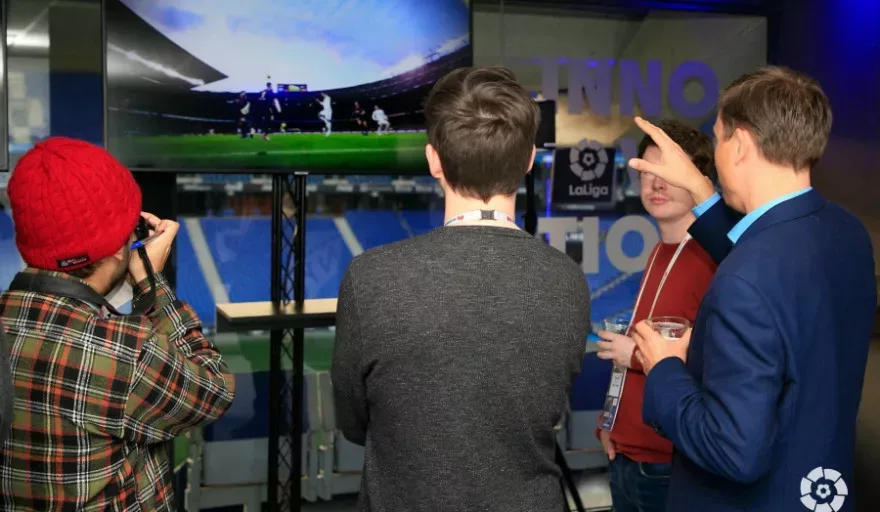Virtual reality, artificial intelligence, machine learning, big data, cloud. Novel subject areas that resonated throughout Barcelona in the week beginning February 25th, but not technologies that many would generally associate with sport. LaLiga, however, the men’s top professional division of the Spanish football league system is changing this view, pioneering the use of transformative tech in order to improve the beautiful game for all.
Inviting us to the RCD Espanyol de Barcelona stadium, a short taxi ride west from MWC’s home in Fira, Joris Evers, the organisation’s Chief Communications Officer, greeted us with refreshments, a warm smile and a firm handshake, his colleagues showcasing some of the organisation’s flagship developments.
Seeing first-hand how the use of AI is both making the game fairer and more exciting, how machine learning is revolutionising the experience of match scheduling and how big data analytics and cloud computing are collectively being used to bolster coaching, referring and fan experiences, there was a lot on show to be excited about.
Speaking with Evers himself, it was easy to see why he was keen to be involved during this transformative period in the sport’s illustrious history.
Q&A WITH JORIS EVERS, LALIGA
What attracted you to joining LaLiga?
Joris Evers (JE): First and foremost, the opportunity to help make Spanish football become even more popular around the globe was too good to turn down.
LaLiga is very ambitious and is investing significantly in growing its brand and attracting more fans to the league in addition to helping grow the popularity of football generally. The organisation has scaled from about 50 people based only in Spain five years ago to more than 600 people around the world today.
It is exciting to contribute to this kind of growth. Outside of that, my career prior to LaLiga had been focused on technology, specifically in Silicon Valley-based companies. Joining LaLiga offered me the opportunity to immerse myself in a combination of the world of football and technology.
What’s your favourite thing about the digital transformation of football?
JE: LaLiga this year celebrates its 90th anniversary. Many years ago, football was purely analogue. Today technology plays a key part in many aspects of the sport, including the development of players, stadiums, the fan experience and broadcasting.
There are incredible advances everywhere, but perhaps most visible is the ability to create an audio-visual spectacle that gets transmitted around the world from various locations in Spain every weekend, technologies applied to 380 matches each year in LaLiga.
Can you make any key predictions about the progression of tech in football throughout 2019?
JE: With time, I expect technology will make sporting experiences much more personal. This wouldn’t just be for viewers, but also for players, evident in both our VR experience efforts and the growing use of data analytics that we’re providing to clubs across the country.
In your opinion, how far should technology in sport go? Could it potentially dampen any excitement and/or drama?
JE: What I like about LaLiga is the organisation’s willingness to experiment and try new things.
It’s often said that if you don’t try, you will never know. Coming back to the imminent growth in personalisation, it may well be that some viewers and fans opt to receive a more classic experience, while others go all in, allowing them to experience football in new ways.


















